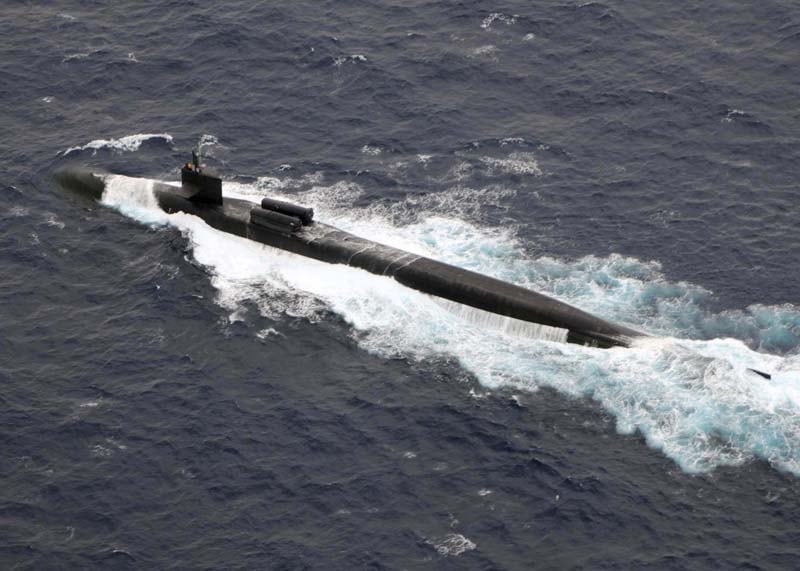source GAIA package: Sx_MilitaryTimes_M6201010010180313_5675.zip Origin key: Sx_MilitaryTimes_M6201010010180313 imported at Fri Jan 8 18:18:04 2016
Discuss:
The arrival of a birthday card in the ship's mail addressed to Capt. Ronald Murray Gero, who was turning 56, marked the beginning of the end of his command of the guided-missile submarine Ohio.
The card — from a woman, postmarked June 19 from Hawaii — first landed in the hands of a crew member whose job it was to screen the captain's mail. He opened it, noting that the heart-covered letter was not from the captain's wife of 32 years, and read the message inside: "I dream what it would feel like … to make love to you."
The card was never delivered. Instead, a crew member kept it as evidence.
Then, he and others began noticing more incriminating evidence: edited e-mails, intimate phone calls and a questionable travel request. Shipmates felt their captain was distracted and sometimes cryptic, behavior that marred his authority. At one point, Gero lost "focus of his mission" during an important transit, an investigation found.
A subsequent command investigation — obtained by Navy Times through a Freedom of Information Act request — found that the relationship bore the hallmarks of an extramarital affair, but acknowledged that the participants likely did not have sex.
"Albeit the number of people on USS Ohio blue who are aware of this relationship is small, but those closest to the CO … all believe that Capt. Gero may have committed adultery, which is degrading unit cohesion and mission readiness," the report found. "The confidence they have in the personal judgment, veracity and moral compass of the CO is likely irreparably damaged, although they could deal with it."
Gero, a 36-year Navy veteran who previously commanded the attack submarine Buffalo, was taken to mast before Rear Adm. James Caldwell, commander of Submarine Group 9. Gero was fired afterward on Sept. 17. He did not respond to calls seeking comment.
Gero told investigators that he and the woman — whose name, along with others, was redacted in the report — had just been "good friends." The report said she was an active reservist, but did not provide a branch or paygrade. He admitted it was an "unusual friendship" because his wife did not know about it, but said it was important to maintain his relationship with this person as it benefited the Navy.
'Inappropriate and weird'
But the concerns of some in the wardroom about the relationship began a year before the birthday card, when Gero invited her to a wardroom-only event.
In summer 2009, some of the sub's officers gathered at the Officer's Club at Hickam Air Force Base, Hawaii, for a gold dolphin board. Gero arrived late, bringing a fellow commanding officer as well as a guest. The CO from the other command felt odd attending what's normally a ship-specific proceeding, the final test for an officer to qualify as a submarine officer, and left after 15 minutes. But the guest stayed.
At one point, Gero asked his guest if she would like to ask a submarine-related question of the candidate, an offer that chafed other board members. "No one objected, though everyone other than Capt. Gero found it inappropriate and weird that [redacted] would attend, especially someone outside the Navy."
Their relationship began with a chance encounter at Lockwood Hall, an officer's quarters in Pearl Harbor, Hawaii, where they both were staying. Gero was in Hawaii to take over Ohio from the Gold Crew, while she was there on active reserve duty. They arranged a program to bring intelligence specialists aboard the Ohio. Their personal relationship grew quickly.
They played golf, went running and dined at restaurants together that summer and the next, Gero later told investigators. His story clashes with her recollection: She said later that they were too busy to meet after work and never did anything fun "like snorkeling." Most of their time together, she said, was spent poolside at Lockwood Hall.
For the most part, the budding relationship was kept hidden from the crew. But some recalled their captain acting oddly.
First, it was his hours. Normally, Gero left the ship late and was reachable by phone afterward. But when the ship returned to Hawaii this year, he'd leave right at the end of normal working hours. Calls to his cell phone often went unreturned for one to three hours. Duty officers took to calling the executive officer instead. Gero, however, disputed this account to investigators.
Nor did Gero attend wardroom functions in which he, as captain, was typically involved.
Then came the phone calls. During surface transits, Gero sometimes made calls on his government cell phone from the bridge atop the ship's sail, in close proximity to others. They recalled Gero starting conversations with a vague greeting like "Hey you," to avoid saying the person's name, while covering the handset and speaking in a hushed tone. Sometimes, Gero would even say things like, "Our bosses wouldn't be very happy if we did that." This was in marked contrast to conversations with his wife, to whom he spoke in normal tones, shipmates said.
Dangerous distraction
Calls to the woman distracted him July 24 when his vigilance was needed most: a transit out of port, according to phone records and the ship's schedule, which were reviewed by investigators.
"It appears that Capt. Gero also lost focus of his mission on at least one occasion, where he was spending time talking to [name redacted] while piloting the [submarine] through Pearl Harbor's restricted waters," their report states.
The last straw, his officers felt, was a planned trip that they suspected he was taking only to see her. Gero had received approval and funding to brief a reserve detachment and attend a dining-in ceremony in October. He coordinated the travel with the woman on his official e-mail account, then forwarded the e-mails to the ship's administrators to set up his travel.
However, some of these recipients noticed that Gero edited the previous exchanges with his friend. The same exchanges appeared different in later e-mails. Gero denied this, but the investigator found later that he altered e-mails to make them appear more related to her work in the reserve.
An officer was mulling all this over in late August when things came to a head. The training meeting at the Sam Adams Lounge on Naval Base Kitsap-Bremerton, Wash., had wrapped up. It seemed, the officer told his colleagues, like their captain was about to use government funds to visit his girlfriend. Other officers agreed. Something had to be done.
At first they considered hiring a private investigator, but they instead ended up filing a complaint to Submarine Force Pacific's inspector general. It was referred to Submarine Group 9 for the investigation that found the unusual relationship, and the suspicions it aroused in the wardroom were sufficient grounds for Gero's removal.
While Gero's travel request was unusual, the trip never went through and there is no proof that Gero misused government funds, according to the report.
It did reach a conclusion, however.
"Procedures for detachment for cause should be initiated based on his special position of trust as a commanding officer," the report recommended.
After his relief, Gero was reassigned to group staff. Cmdr. Theodore Schroeder was named interim CO of the Ohio Blue Crew.





